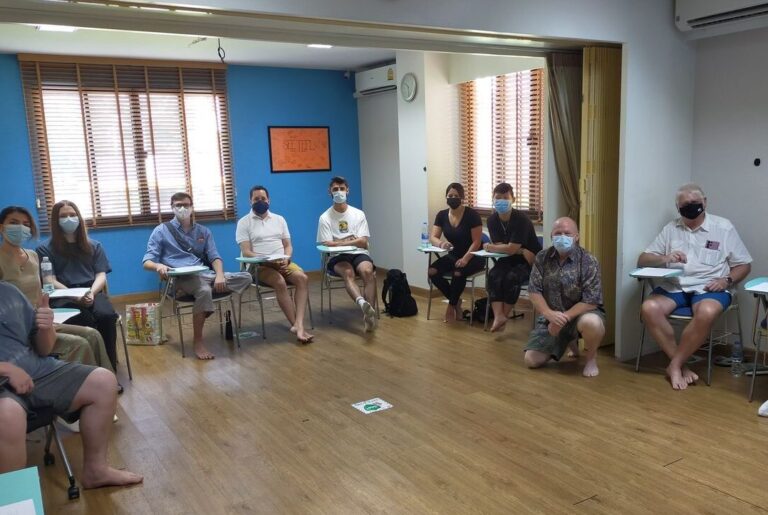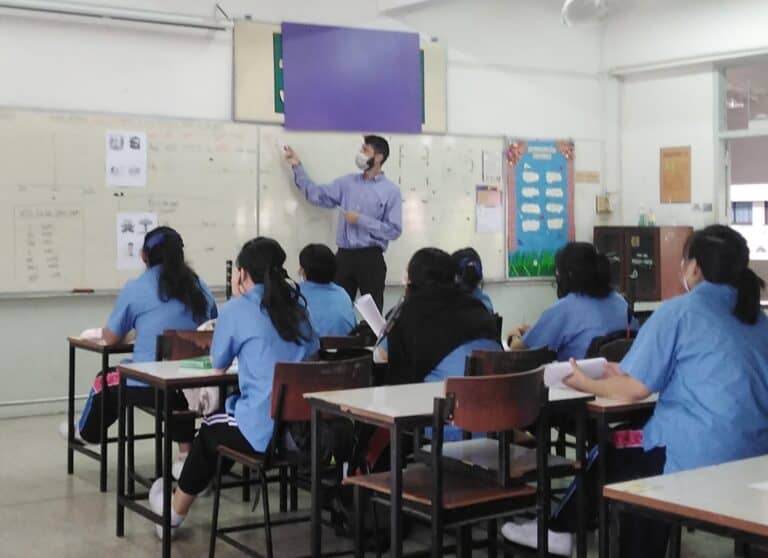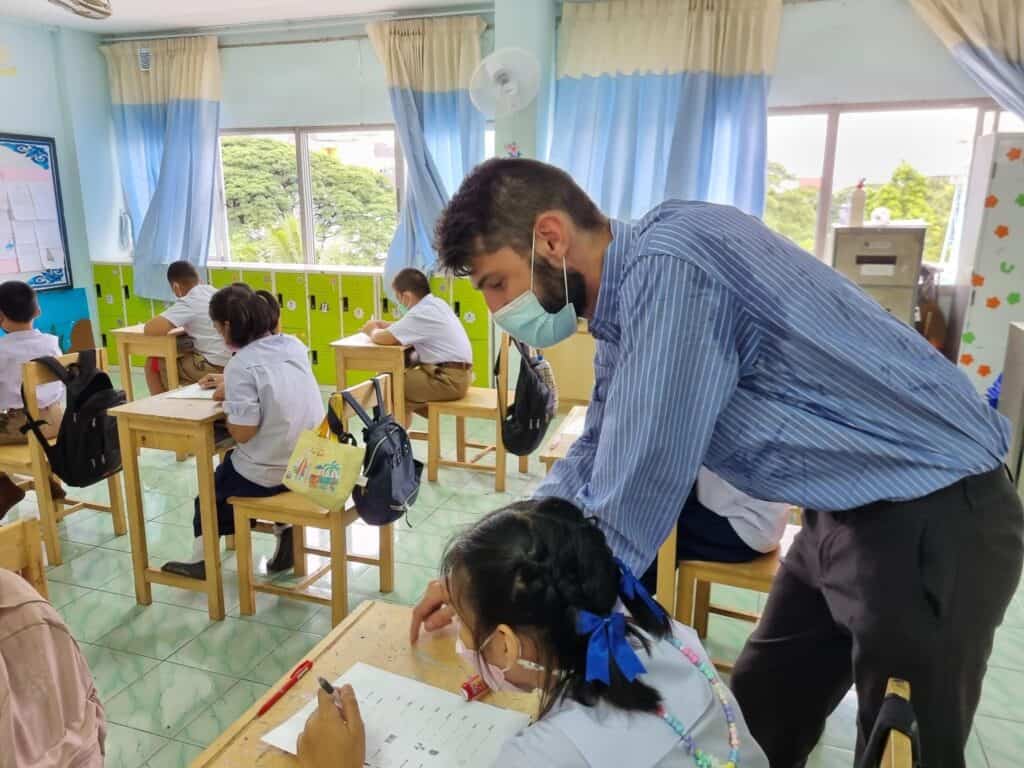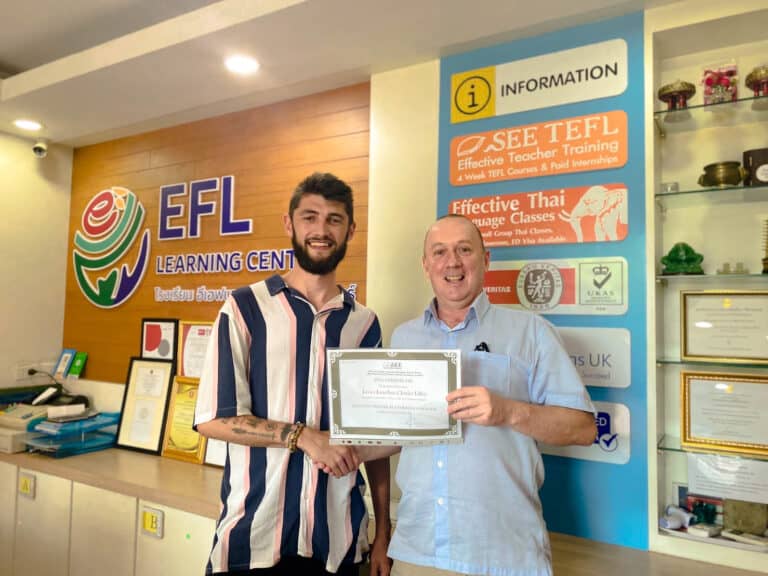Disclosure: This post contains affiliate links that I may earn a small commission from if you purchase something through them. This comes at no extra cost to you!
So, you’re thinking about taking a TEFL course in Thailand? Well, you’re in the right place!
The aim of this guide is to provide a true, honest and accurate representation of what you can expect if you’re considering taking a 4-week in-person TEFL course in Chiang Mai, Thailand.
Teaching English is a massive draw for foreigners who want to move to Thailand and I swear maybe 1 in 10 of the people I meet here are either teaching or used to be. If your goal is to get rich and go to sleep on a bed of Baht… let’s just say this won’t be for you. Don’t forget – this is Thailand and salaries are often quite low.
Teaching here is something that allows you to live somewhere exotic, fulfill your soul by working with great children and have an amazing work-life balance. That’s the end game, now let’s talk about how to get there.
In this post I’ll fully dissect the structure of a 4 week course and provide everything you need to know before giving some thoughts from my personal experience and honest pros and cons. There’s a lot of content here, especially in the second half, so strap in and get ready to find out what it’s really like to take a TEFL in Chiang Mai!
For reference, I took the course in July/August 2022 with SEE TEFL.
Table of Contents...
Toggle
What is TEFL?
TEFL is an acronym for “Teaching English as a Foreign Language”. A TEFL certification is an internationally recognised professional certificate that allows people to teach English as a foreign language online or abroad in over 80 countries.
Anyone who can fluently speak English can take a course and you don’t have to worry about learning any new foreign languages because every lesson would be taught fully in English. Most people use the certificate to teach in Asia, usually China, Thailand, South Korea, Japan, Vietnam and Cambodia.
To teach English full time in most countries you will need a bachelor’s degree in any subject as well as a TEFL, which can limit your options if you don’t have one – like me! With a TEFL there are many other avenues you can take, though, like teaching online, privately or part-time tutoring in a language school. In order to work full-time at a formal school in Thailand though, you need the necessary “non-immigrant B work visa” which unfortunately you can’t get without a bachelors degree.
There are hundreds of companies on the web offering TEFL courses (such as ITA, SEE TEFL, XploreAsia and The TEFL Academy) and it can be hard to choose between them all.
First, you need to decide whether you want to take the course online or in-person.
Online vs on-site courses
Online
In a nutshell, the 120 hour online courses are the more popular route to acquiring a TEFL for most people. This is for many reasons, for example; it’s cheaper, you don’t have to travel across the world, you can do it in your spare time while working your day job, and so on.
An online course could honestly cost anything from $50 – $1000 depending on the company you choose and the course content, but most commonly they’re around $100 – $200. After completion, online courses provide you with the same certificate as the on-site courses.
On-site
On-site courses have a hefty price tag attached to them ($1400 – $1500) but provide a much more intricate learning process for potential teachers.
Usually you’re in a classroom setting from 9am-4pm everyday (Mon-Fri) for 4 weeks (120 hours) soaking up lots of information in a short time and applying it in real classrooms by week 3. These courses are notoriously intense due to those teaching experiences which are the biggest difference between online and on-site courses. In week 3 you will begin planning lessons for at-least 6 classes which you’ll teach in real schools with an assessor present. This is the graded part of the course.
As well as that, you’ll usually receive some Thai language lessons and form friendships with like-minded fellow teachers.

Why Chiang Mai?
Personally, the reason I decided to take the course in Thailand is because of a few reasons, but mainly because A) I have loved and missed Chiang Mai ever since I first visited in 2016, and B) I have no bachelor’s degree so thought it would give me a better chance at getting my foot in the door.
In my opinion, Chiang Mai is the ideal place to base yourself while you take the course, and there are many reasons why so many foreign English teachers, digital nomads and expats call this special city home. Affordable cost of living, plenty of amazing things to see and do in your spare time (not that you’ll have much), delicious cuisine, endless cute coffee shops, buzzing nightlife and just overall good vibes. For me, it was an easy choice.
SEE TEFL was the company that initially caught my attention on the internet as they solely teach the course on-site in Chiang Mai with no online option available. I sent a few emails back and forth asking some questions and decided they were the most reputable provider for in-person course.

My journey to TEFL
Well, long story short, 2022 was a very spontaneous year for me.
Getting a TEFL certificate and teaching abroad was always something that interested me but the timing was never right until this year when one thing led to another and I had the opportunity to bite the bullet and go for it.
I started a new chapter of life around April and began travelling solo for the first time. I left home and travelled to the Netherlands, Egypt, Morocco, Belgium and Norway until June before deciding to book my TEFL course only about 3 weeks before it started in Thailand. I booked my flights and prepared myself to finally get back to Southeast Asia for the first time since before Covid, but before knuckling down to study in Chiang Mai I spent some time seeing Bulgaria, Dubai and Phuket.
It was all super spontaneous, but it was always something that had interested me so I just said to myself, f*** it, it’s now or never!
Thinking of visiting Southeast Asia soon? Don’t miss these essential guides to help planning your trip:
Course structure
The course at SEE TEFL is structured into two 2-week blocks. The first two are classroom-based and the second two are more “hands on”.
Weeks 1-2
With just 4 weeks to train regular people to be English teachers, no punches are pulled, even from day one. The first couple weeks consist of an intense introduction to learning how to teach grammar and vocabulary, followed by practicing writing on the whiteboard and presenting to the class. In other words, straight into the deep end!
You largely focus on breaking down a sentence’s structure, typical grammatical terms, the use of body language prompts to aid learning, effective classroom discipline techniques and how to plan for a lesson. These weeks were sometimes tedious, with every day spent in the same classroom with the same two lecturers, but they were very effective.
Be prepared for an information overload!

Weeks 3-4
The second half of the course is even more intense. Weeks 3 and 4 consist of applying everything you learned in weeks 1 and 2 towards 6 OTP’s (Observed Teaching Practices) in real schools across Chiang Mai. This is one of two graded parts of the course.
One of your tutors will monitor each class and at the end you will receive a grade for each one: A, B and C being passes and C- or D being fails. At the end of the course your average grade will appear on the back of your certificate which you could use as leverage in a job interview, but apart from that the grades don’t really mean much. Fails are extremely uncommon, but if you fail 3 OTP’s then you fail the course. I will talk more about this in the pros and cons section because I have a few things to say on that!
The OTP’s range all the way from kindergarten level to vocational college, with class sizes from 20 to 45. For many people, myself included, this was the first time we had ever stood up in front of a whiteboard and spoken to a class, let alone try to teach them a new language! Week 3 is especially stressful because your head is scrambling trying to remember all the stuff you have to say and do, but by week 4 your confidence will have grown and you’ll begin to see yourself adapting to the environment naturally.


Overall, the children and young adults you’ll teach in Thailand are very respectful. It’s nothing like teaching in schools in Europe. I say overall, but there are still some troublemakers, especially in the primary school classes. My worst class was actually, typically, my first one. I had around 20 P3’s and I’m not sure what was in their cereal that morning, but my God, they were uncontrollable. I was brand new and felt a bit out of my depth trying to control 20 crazy kids, but I passed that class and from then on it was mostly smooth sailing. I found that the older the students got, the more interested they were in learning.
All students you’ll teach in the OTP’s already have basic prior learning of English too, so don’t worry, they won’t be looking at you going “what the hell is this crazy farang on about?!”… hopefully.
Near the end of week 4 you’ll have the second graded part of the course which is a simple, 6-question grammar test that is required by the government. Think of this as an impossible-to-fail-memory-test because the tutors will shamelessly just give you the questions and answers the day before.

Pros of an on-site TEFL
1. The 6 OTPs are a priceless experience
By doing the on-site course your confidence grows tenfold in these 6 teaching practices. Overall I had a kindergartens, P5’s, P3’s, a high school class, a class at a vocational college and finally a 1-1. My classes averaged around 20 students and I really enjoyed these experiences.
The difference in confidence I felt in myself between OTP 1 and OTP 6 was crazy. You see yourself progress with each class and soon you’ll start to actually enjoy it and focus more on the students and less on yourself.
By doing an online course you miss out on this valuable opportunity to teach in a real environment which, to me, was priceless. Even though I don’t have a job teaching in Thailand, I can already claim I’ve taught in 6 schools across Chiang Mai.
2. The Thai language classes
During the course we received about 8 hours of Thai lessons with a Thai woman so that we, as teachers, know how it feels to be a student learning a new language. It’s also great because it provides you with basic Thai skills to use while you live in Chiang Mai for the duration of the course, if not longer.
We learned essential phrases, like “Please can I have an iced coffee” (well, essential to me anyway…) as well as the basic greetings and different tones. Again, you’d likely miss out on this valuable knowledge by taking an online course.
The Thai people absolutely love it when you speak their language so this is a great tool to have at your disposal, even if it’s just the basics.
3. The two full time tutors
At SEE TEFL there is one lead trainer and another trainer who teaches the grammar. The lead trainer has been teaching the same course there for around 10 years so being able to learn from him was great.
All the support you could possibly need is provided, including lots of feedback and encouragement throughout. You’re able to ask questions throughout the 4 weeks, either in person or on WhatsApp, and pick their brains about anything related to teaching in Thailand which is a fantastic resource to have.
4. The relationships you make
By doing the course in-person I made great relationships with like-minded people that you’d never get by taking an online TEFL at home. We were all in the same boat and worked through some challenges together, by discussing and learning from each other.
If you’re moving to Chiang Mai on your own it’s great to know that there will be other people in a similar situation to you. On my course, there were 4 of us that became really close and we had lunch together every day, went out at the weekends, met up for dinner, and so on.

5. Learning practical skills
You wouldn’t necessarily think that Europeans instantly have an academic advantage on this course, even though English is my first (and only) language, would you?
Well I’m not sure how it works, but I was one of only two Brits on my course and during the first week we both realised we had never been taught any of this grammar stuff in our lives – we were complete beginners!
Terms like infinitive and auxiliary verbs, all the names for the different tenses and the use of the passive and active voices was all news to me. The Europeans and Americans cruised through these subjects because it was taught to them as children when they were learning English. I’m assuming it’s just not taught in British schools because the two of us were completely clueless.
I knew how to use it all, and obviously I knew the difference between past and present tense, but I had no idea what all the terminology was. I felt like I was playing catch up from day one on that, but now I know.
I originally had this down as a “con” because it confused me, but I’ve since realised that learning these aspects of my own language is obviously a positive thing!
6. Cultural awareness day
Cultural awareness day is a great idea from the school to encourage students to embrace the religion and culture of Thailand and learn some important lessons before living here. With a local guide we walked and drove around the city, visiting a temple and the Chiang Mai Cultural Centre before going for lunch together.
As well as providing an educational aspect, cultural awareness day was a great opportunity to take our minds away from studying and relax.

Cons of an on-site TEFL
1. The pass guaruntee
Now, this is a tough one, and you’re probably looking at it thinking “isn’t that a good thing James… I can definitely pass?!” but I found it kind of annoying. Effectively, if you book the course and you have 4 limbs, a brain and are half decent at English, you will pass. It’s guaranteed. No matter how good or bad you are.
Picture this; you work really hard for 4 weeks, constantly preparing materials, making sure everything is in order and generally trying your best to impress and stay ahead of the game. Then there’s someone who doesn’t really want to be there, doesn’t know computer basics like how to copy and paste and doesn’t listen to, or apply, anything taught in the training room. At the end of the course you both pass with the same certificate. Annoying, right? Or am I just too competitive? Probably.
Being as honest, unbiased and objective as is humanly possible, there were some teachers who should not of passed the course I was on (we were encouraged to watch each other, which is what this is based on). Now, I was certainly not perfect (not even close!), but I just cannot understand why you wouldn’t fail people who aren’t good. At the end of the day, it seems pretty strange to just put anyone into the big bad teaching world with the organisation’s reputation massively at risk, but what do I know.
2. The grading system
During the 6 OTP’s you’re graded by an assessor (one of the TEFL trainers) and at the end of the course your average grade from the 6 classes is put on the back of your certificate. Truth be told, in the eyes of a school when applying for a job, the grade doesn’t really matter and they probably wont even look at it, but it does help boost your confidence during the teaching practices.
A+, A, A-, B+, B, B-, C+ and C are all passing grades, while C-, D and F are fails. If you fail 3 or more, then “you fail the course”. You are encouraged to keep your OTP grades to yourself, but obviously people talk and word gets around and across the board the grades seemed very inconsistent, as if there were varying expectations for each of us. We were encouraged to watch each other’s classes and I’m not trying to be mean, but there were some seriously questionable classes that passed.
While watching somebody teach the incorrect answer to a question or incorrect spelling of a word is hard to see, I understand that pressure and nerves can play a part in that. But it’s the classes where nothing we were taught was applied, the classes where teachers did not have the required materials ready and classes that went on 20 minutes too long that bugged me.
Classes like that maybe would get a fail, but sometimes (usually, it seemed) they’d get a C, which is a pass. Comparatively, the teachers who had everything prepared, finished on time and applied what we had been instructed to apply would maybe get a B+ or B. Until the last couple of OTP’s A’s were extremely rare, and across the board the grading system seemed very inconsistent.
To conclude, the grades don’t matter and this is really just a personal gripe because I’m competitive, although I know I’m not the only one who felt the same way. Everyone passed the course I was on, even though I know for a fact that one person failed at-least 3 OTP’s, so it all comes back to that pass guarantee I guess, but whatever, I’m tired of moaning!
Final thoughts

Well, I made it!
First off, I’d highly recommend doing a course in person like this if you’re unsure about standing up and teaching with no practical experience, like I was, instead of completing it online and jumping straight off a flight to start a job!
On the first week, I can’t lie, I was feeling very intimidated and there were a lot of questionable thoughts floating around my head. This was due to nerves and quickly I realised that everybody was in the same position which put me at ease.
There were only 3/11 of people on the course who had prior teaching experience, but even they were also starting from scratch when it came to teaching English as a foreign language. By the third week, I still felt miles off being ready to actually teach a class, but again I convinced myself I would be fine because… so was everyone else!
SEE TEFL teach you everything you could possibly need to know through “ideas of best practice”, most of which are rarely actually applied in the real world. It’s maybe a terrible comparison, but think of it more as an idiot’s guide to teaching English rather than exactly what you should do on the job. I have friends in Thailand who are teachers and it was really interesting to compare what we were being taught to how it actually happens in the real world, for example; a lesson plan needed to be at least 5 pages of A4, whereas my friend’s lesson plans at schools are a couple paragraphs at best (if they even need to make one).

Even though 4 weeks doesn’t seem like long to become a teacher from scratch, you can rest assured that it is possible to get through this course. Well, actually, as mentioned earlier, it’s literally impossible to NOT get through!
I hope there wasn’t too much negativity in this post – I’m just trying to be as honest as possible and overall it was a brilliant experience.
A TEFL course gives anyone the opportunity to be a teacher, and it’s a great route to take to become one and live overseas. Do everything that’s asked of you until you’ve got that certificate in your hand, then you can use the methods you’ve been taught however you like when you get a job teaching, wherever that may be!
Good luck!

Thank you for reading this travel guide – I hope you found it helpful! Feel free to leave a comment below if you have any questions and I’ll get back to you as soon as possible
Happy travelling!
HELPFUL RESOURCES FOR PLANNING YOUR TRIP
Accommodation: Booking.com, Hostelworld
Tours: GetYourGuide, Viator, Klook, TripAdvisor
Transport: 12Go, Omio, Trip.com, Rome2Rio
WHO IN THE WORLD IS JAMES?
Click below to learn more about my story, including 5 random facts about me, some travel FAQ’s and my entire travel history.
Related posts:
- The Perfect Doi Inthanon Day Trip Itinerary from Chiang Mai
- Phi Phi Islands Day Trip from Phuket (Maya Bay Visitor’s Guide)
- Ultimate Pai Travel Guide & 11 Adventurous Things to Do
- Thailand to Laos Visa Run by Bus (Chiang Khong – Huay Xai Guide)
- 17 Awesome Things to do in Chiang Rai, Thailand – Ultimate Travel Guide
- Complete Chiang Mai Travel Guide & Best Things To Do

